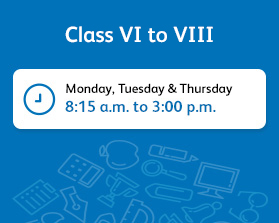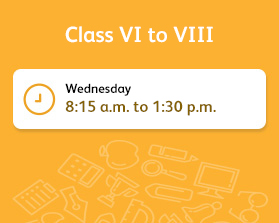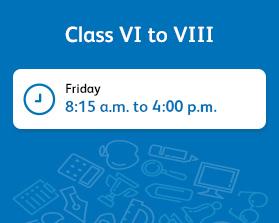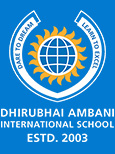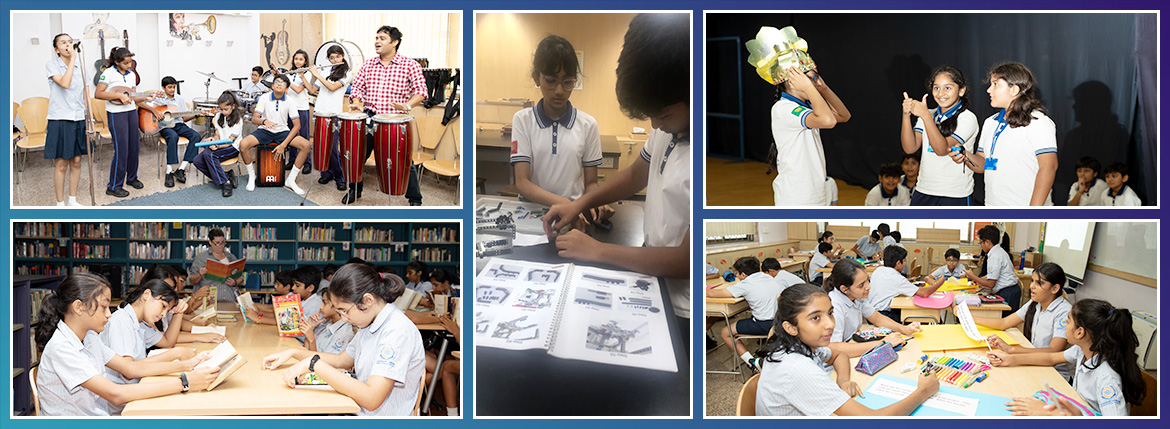Middle School Programme
Classes VI to VIII (MYP)
Dhirubhai Ambani International School is a candidate school* for the MYP. This school is pursuing authorization as an IB World School. IB World Schools share a common philosophy- a commitment to high-quality, challenging, international education- that we believe is important for our students.
* Only schools authorized by the IB Organization can offer any of its four academic programmes: the Primary Years Programme (PYP), the Middle Years Programme (MYP), the Diploma Programme (DP), or the Career-related Programme (CP). Candidate status gives no guarantee that authorization will be granted. For further information about the IB and its programmes visit www.ibo.org.
The International Baccalaureate (IB) Middle Years Programme (MYP) at DAIS will comprise MYP 1 to 3, i.e. equivalent to Classes VI to VIII (MYP). In Academic Year 2023-24, Classes VI to VII (MYP) will be offered and from Academic Year 2024-25 onwards Classes VI to VIII (MYP) will be offered. The MYP is designed to meet children's varied intellectual, physical, and emotional needs. MYP is an interdisciplinary programme driven by a conceptual and contextual focused curriculum, building on the concepts and skills learnt in the Primary Years Programme (PYP).
The MYP provides a structure of learning, encouraging students to become creative, critical and reflective thinkers. By learning their own languages and about their culture, students begin to develop the foundation of internationalmindedness, which is an integral part of MYP. The emphasis on multilingualism allows for openminded thinking and effective communication. The Programme is intellectually challenging and encourages students to make connections between the subjects and the real world. It fosters the development of intercultural understanding and global citizenship, which are essential for life in the 21st century.
The MYP units of study focus on transferable key concepts and subject-specific related concepts that extend beyond particular origins, subject matter, or place in time. The IB believes that students learn best when the teaching and learning are contextual, connected with their experiences, and rooted in the real world. Towards achieving this objective, the MYP recognizes six global contexts that are transitionally rooted in the PYP transdisciplinary themes. These are explored through inquiry-based units in each subject throughout the programme to help students develop a sense of understanding of the world, explore common humanity, and inculcate a shared guardianship of the planet. Together, concepts and contexts are used as a lens to focus on 'Big Ideas' that are transferable across units and subjects and embedded in the real world.
In each year of the MYP students explore purposeful and collaboratively planned units (IDU's) in novel and creative ways between two or more disciplines. Students are immersed in authentic learning around complex issues and ideas connecting to the real world. The IDU's enable students to transfer knowledge understanding and skills across subjects in an authentic manner encouraging them to problem solve and experience how they too can make a difference as global citizens now and in their future.
Approaches to Learning Skills (ATLs)
Throughout a student's IB education they are taught how to use essential skills to develop as life-long learners and supporting them to become global citizens ready to make a difference in the communities they choose to live. In MYP the students develop skills of Self- management, Social, Communication, Research and Thinking. These skills are taught explicitly within units of learning as well as becoming interwoven throughout a child's life at DAIS. The many opportunities students are given at DAIS both inside and outside of the classroom enables them to develop these skills to a high level allowing for student agency. ATLs enable students to understand the power of learning 'how to learn'.
Service in MYP
Service at DAIS celebrates the Indian Ethos of "Vasudhaiva Kutumbakam": the world is one family of learners. Students develop their knowledge, skills, and values to engage with the world as global citizens through service. As an essential component of the IB MYP, service emphasises the importance of taking what you learn in the classroom and applying it to real-world situations. It goes beyond completing a task; it involves reflecting on your experiences, developing a sense of responsibility, and understanding the impact of your actions on both you and the community, both local and global. Service is not about the benefits that the "server" receives, but the greater benefits to the community that is being "served". Service goes beyond mere volunteering and is designed to be a thoughtful and purposeful act that contributes to the well-being of others and at DAIS students make a difference to the lives of others.
Community Project (CP)
In the final year of MYP at DAIS (Class 8) the students engage in a culminating experience over several months that allows them to put into practice what they have been learning throughout their three years in the MYP. This project (CP) is an extended learning experience following the service-learning cycle (investigating, planning, taking action and reflecting). Students apply their disciplinary learning including ATL skill development and Service as Action learning outcomes to address the DAIS philosophy of Global Citizenship and the DAIS Objectives of: inculcating in children, the values of compassion, empathy and respect towards others and the environment, helping children develop into principled, reflective and self-directed learners, encouraging children to develop the qualities of self-discipline, positive self-image, teamwork, spirit of adventure and leadership.

School Timing
